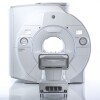Hospital readmission tied to complications, not care errors: study
by Lauren Dubinsky, Senior Reporter | February 03, 2015

Dr. Ryan Merkow
Courtesy of The American
College of Surgeons
Courtesy of The American
College of Surgeons
Penalizing hospitals for post-surgery readmissions on the assumption that they result from care problems may be counterproductive in terms of improving hospital care quality, according to a Northwestern Medicine and American College of Surgeons study. The study, "Underlying Reasons Associated with Hospital Readmission Following Surgery in the United States," appeared in JAMA.
Policymakers have been increasingly focusing on reducing hospital readmissions over the past few years but the causes for readmissions after surgery were not known, according to Dr. Karl Y. Bilimoria, surgical oncologist and vice chair for quality at Northwestern Memorial Hospital, and director of the Surgical Outcomes and Quality Improvement Center at Northwestern University Feinberg School of Medicine.
The study found most readmissions come from surgical complications, such as wound infections, that occurred after discharge and were not present during a patient's hospital stay more than 97 percent of the time.

 Currently, a hospital's rate of all its unplanned patient readmissions, which includes surgical patients, is publicly reported by CMS. In addition, a hospital's reimbursement from CMS gets reduced if CMS determines that a hospital has too many readmissions within a period of 30 days following a patient's discharge for certain care, including total hip and knee replacement surgery.
Currently, a hospital's rate of all its unplanned patient readmissions, which includes surgical patients, is publicly reported by CMS. In addition, a hospital's reimbursement from CMS gets reduced if CMS determines that a hospital has too many readmissions within a period of 30 days following a patient's discharge for certain care, including total hip and knee replacement surgery.
"Since the Hospital Readmission Reduction Program is a law that is not going anywhere anytime soon, hospital administrators need to have a strategy to deal with the readmissions," Dr. Ryan Merkow, co-author of the study and chief surgery resident at the University of Chicago, wrote to DOTmed News.
The study looked at six different surgical procedure types in a total of 498,875 separate patient cases, including bariatric surgery, colectomy or proctectomy, hysterectomy, total hip or knee replacement, ventral hernia repair, and lower extremity vascular bypass.
The researchers found that 5.7 percent of the patient cases had unplanned readmissions. Of those unplanned readmissions, only 2.3 percent of patients were readmitted due to a complication that occurred during their initial stay in the hospital.
The study also found that the most common cause for unplanned readmissions was surgical site infections, at 19.5 percent, followed by delayed return of bowel function, with an overall rate of 10.3 percent.
This study can help hospitals understand the causes and factors associated with readmissions after surgery and develop an effective strategy.
Merkow recommends that hospitals join the American College of Surgeons National Surgical Quality Improvement Program to help internally identify procedures that have high readmission rates within their own institutions as well as the individual causes. "This will allow hospitals to measure their own readmission rates after surgery as well as track the effectiveness of their readmission reduction initiatives over time," he wrote.
Policymakers have been increasingly focusing on reducing hospital readmissions over the past few years but the causes for readmissions after surgery were not known, according to Dr. Karl Y. Bilimoria, surgical oncologist and vice chair for quality at Northwestern Memorial Hospital, and director of the Surgical Outcomes and Quality Improvement Center at Northwestern University Feinberg School of Medicine.
The study found most readmissions come from surgical complications, such as wound infections, that occurred after discharge and were not present during a patient's hospital stay more than 97 percent of the time.
Your Centrifuge Specialty Store
Quality remanufactured Certified Centrifuges at Great prices! Fully warranted and backed by a company you can trust! Call or click for a free quote today! www.Centrifugestore.com 800-457-7576

"Since the Hospital Readmission Reduction Program is a law that is not going anywhere anytime soon, hospital administrators need to have a strategy to deal with the readmissions," Dr. Ryan Merkow, co-author of the study and chief surgery resident at the University of Chicago, wrote to DOTmed News.
The study looked at six different surgical procedure types in a total of 498,875 separate patient cases, including bariatric surgery, colectomy or proctectomy, hysterectomy, total hip or knee replacement, ventral hernia repair, and lower extremity vascular bypass.
The researchers found that 5.7 percent of the patient cases had unplanned readmissions. Of those unplanned readmissions, only 2.3 percent of patients were readmitted due to a complication that occurred during their initial stay in the hospital.
The study also found that the most common cause for unplanned readmissions was surgical site infections, at 19.5 percent, followed by delayed return of bowel function, with an overall rate of 10.3 percent.
This study can help hospitals understand the causes and factors associated with readmissions after surgery and develop an effective strategy.
Merkow recommends that hospitals join the American College of Surgeons National Surgical Quality Improvement Program to help internally identify procedures that have high readmission rates within their own institutions as well as the individual causes. "This will allow hospitals to measure their own readmission rates after surgery as well as track the effectiveness of their readmission reduction initiatives over time," he wrote.
You Must Be Logged In To Post A CommentRegisterRegistration is Free and Easy. Enjoy the benefits of The World's Leading New & Used Medical Equipment Marketplace. Register Now! |
|















